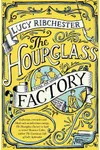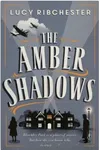Picture a Scottish storyteller spinning tales of suffragettes, spies, and secrets—meet Lucy Ribchester! Born in Edinburgh, this historical crime fiction maestro has enchanted readers with her vivid settings and whip-smart mysteries. From the bustling streets of Edwardian London to the cryptic halls of Bletchley Park, Ribchester’s novels are a thrilling blend of history and suspense, earning her a dedicated following and critical acclaim.
With a knack for uncovering the hidden lives of women in bygone eras, Ribchester crafts stories that feel like stepping into a time machine—only with more murder and intrigue. Let’s dive into her journey, from a book-loving kid in Scotland to an award-winning author who’s redefining the historical mystery genre.
The Making of Lucy Ribchester
Lucy Ribchester was born in Edinburgh in 1982, where her love for storytelling bloomed early. As a child, she rewrote novels by Enid Blyton and Christopher Pike, adding her own twists to their tales. She studied English at the University of St Andrews, earning first-class honors, before diving into Shakespearean Studies at King’s College London and Shakespeare’s Globe. Her academic roots in literature and history laid the foundation for her richly detailed novels.
Before becoming a full-time writer, Ribchester’s career was a colorful tapestry: organizing parties at a London cinema, working for Al Jazeera, freelancing in Spain, and even coordinating cruises for the National Trust for Scotland, where she swam with icebergs and learned to ceilidh dance. These eclectic experiences fueled her creative spark, leading to her debut novel and a Scottish Book Trust New Writers Award in 2013.
Lucy Ribchester’s Unforgettable Stories
Ribchester’s novels are historical crime fiction at its finest, blending meticulous research with page-turning suspense. Her debut, The Hourglass Factory (2015), is a whirlwind of suffragette marches, circus freaks, and corset-shop secrets in 1912 London. Centered on journalist Frankie George and trapeze artist Ebony Diamond, it’s a rollicking mystery longlisted for the Historical Writers Association Debut Crown and selected as Waterstones’ Edinburgh Book of the Year.
Her second novel, The Amber Shadows (2016), transports readers to Bletchley Park during World War II. Typist Honey Deschamps unravels coded messages and mysterious amber packages linked to the looted Amber Room, all while navigating wartime intrigue. Critics praised its quirky take on spy fiction and vivid portrayal of women’s lives. In 2024, Ribchester released Murder Ballad, set in 18th-century Edinburgh, exploring the relationship between a street-ballad singer and a female composer in a haunting musical mystery.
Ribchester’s style is a Hitchcockian blend of suspense, wit, and historical texture. Her heroines—journalists, codebreakers, singers—are bold, complex women navigating societal constraints. Themes of gender equality, loyalty, and the power of storytelling weave through her work, making her novels both thrilling and thought-provoking.
Why Lucy Ribchester Matters
Lucy Ribchester’s impact lies in her ability to breathe life into forgotten corners of history, particularly the experiences of women. Her novels don’t just solve mysteries; they challenge readers to rethink the past, from suffragette activism to wartime resilience. Awards like the Robert Louis Stevenson Fellowship and shortlistings for the Costa Short Story Award underscore her growing influence in historical fiction.
Beyond writing, Ribchester inspires as a tutor, leading workshops in schools, prisons, and community groups to empower emerging writers. Her dance journalism and short stories, published in outlets like The Guardian and BBC Radio 4, showcase her versatility, cementing her as a vibrant voice in Edinburgh’s literary scene.
- Born: 1982, Edinburgh, Scotland
- Key Works: The Hourglass Factory, The Amber Shadows, Murder Ballad
- Awards: Scottish Book Trust New Writers Award (2013), Robert Louis Stevenson Fellowship (2016)
- Fun Fact: She makes origami jewelry from old book pages!
Snag The Hourglass Factory and dive into Lucy Ribchester’s thrilling world of historical crime fiction—your next obsession awaits!

